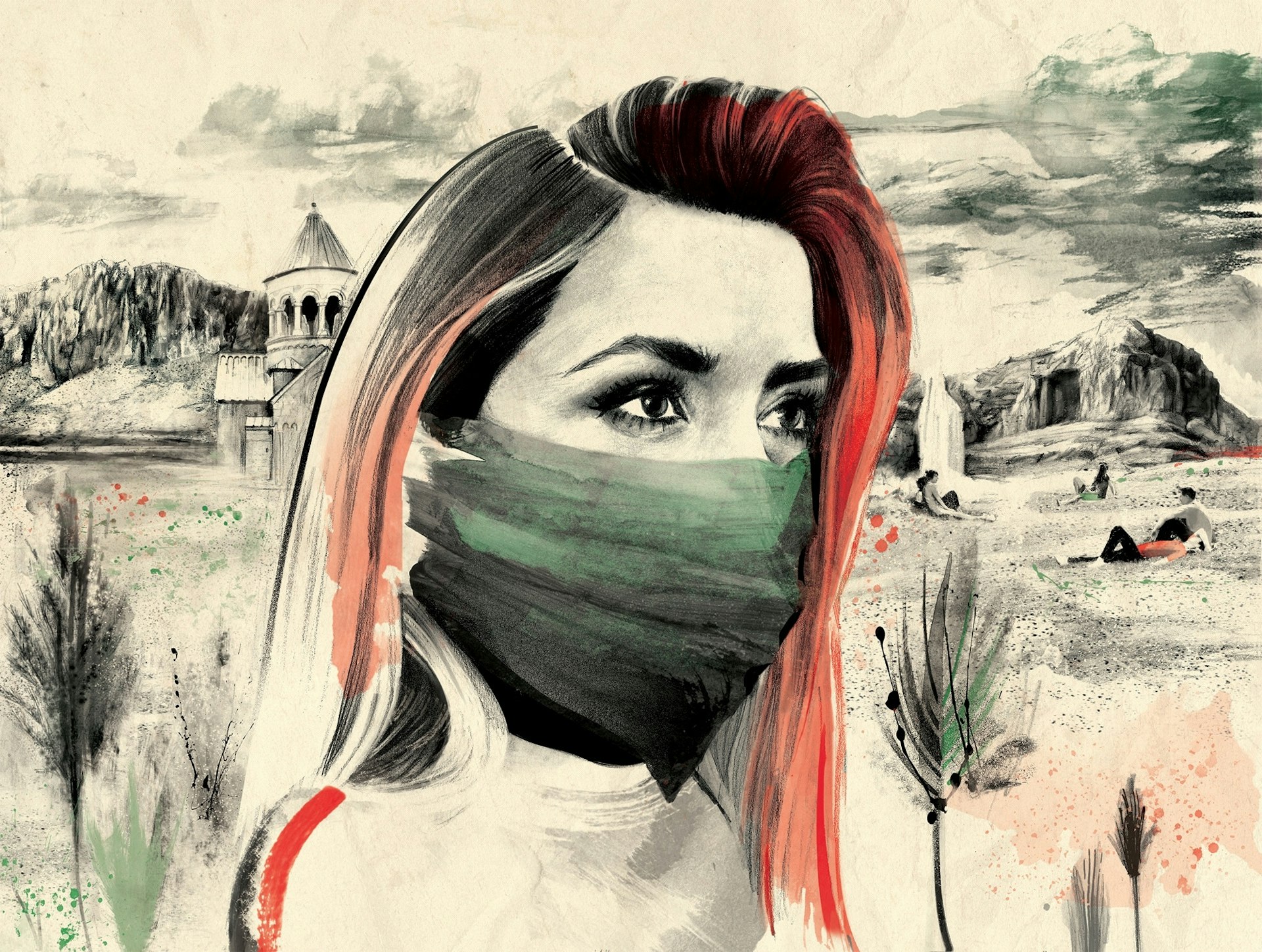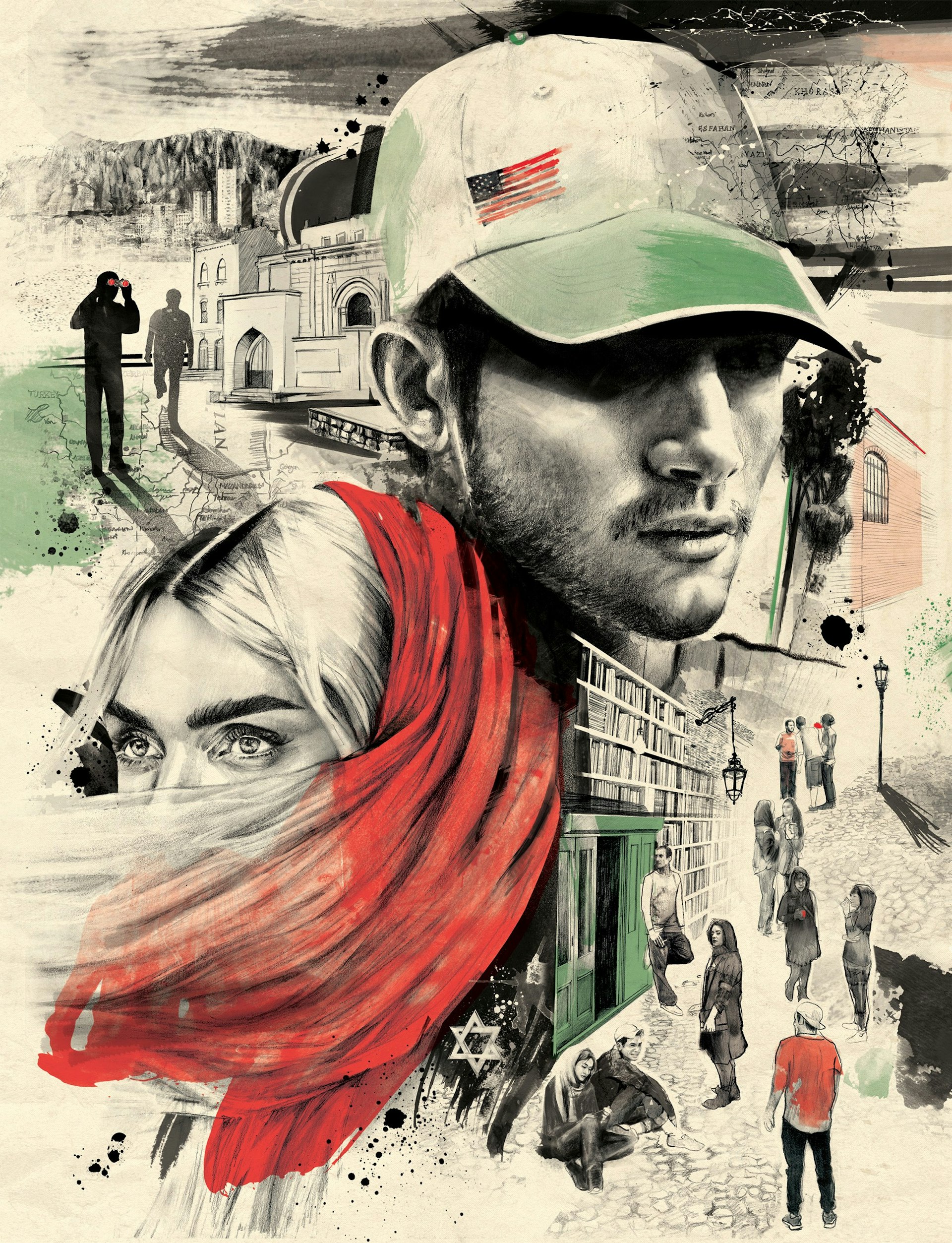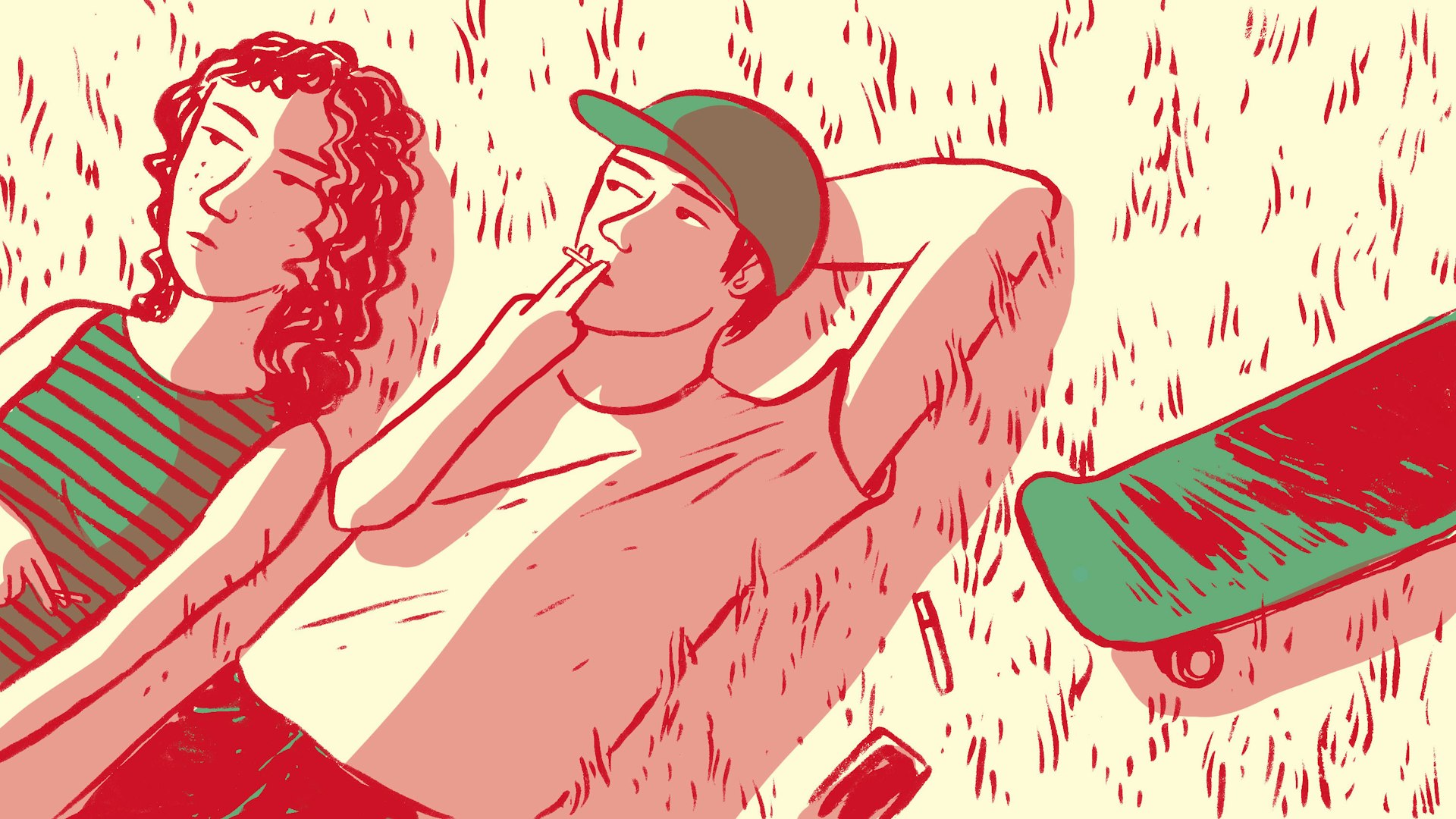
Iran’s youth are kickstarting a grassroots revolution
- Text by Alex Pierce
- Illustrations by Christina Polop
In a smoky apartment filled with blaring rock music, a group of twenty-somethings dip in and out of various doorways, chatting and dancing. A table full of black-market alcohol is just about visible under the dim light of a blank TV screen while, in the next room, a group of friends roll about laughing after taking a mixture of synthetic drugs.
To most Westerners, this would feel like just another house party. But in Tehran, these acts are part of a wave of clandestine dissent against the country’s hardline laws and social values.
Iran is a strict Islamic nation where undercover ‘morality police’ patrol the streets, keeping watch for anyone who doesn’t follow conservative modes of dress and behaviour. Public socialising between unmarried men and women is forbidden. Repeated alcohol-related offences can lead to lashings, lengthy jail terms or even the death penalty. Even just a stray tuft of hair sticking out under a woman’s headscarf can result in a fine or arrest.
But here, in a cosy apartment on a tree-lined street north of the city, partygoers have forsaken hijabs and loose-fitting clothing for skinny jeans and open midriffs, exposing body piercings and homemade tattoos. There is no palpable sense of fear or apprehension, only a curiosity for the visitor in their midst. “How are the drugs in Europe?” “What’s it like to go to Glastonbury?” “Is Berlin’s club scene really as good as it sounds?”
After just a couple of days in the country, and about half an hour at the party, the stream of questions initially suggests a yearning to experience the world beyond Iran – a possibility out of reach for most. “It’s so hard to get a visa to leave,” says Reza, a student from the capital – dressed in skinny jeans, high-top boots and a leather jacket – who has refused to do military service after school, disqualifying him from obtaining a passport.

“First, you need to come from a rich family with a lot of money,” he continues, handing over a cup of vodka with a weary shake of the head. “Then the government wants to make sure you’ve got a reason to come back, so they want to know if you’ve got houses or a business or something else in the country.”
Yet despite an obvious physical distance from the West, these twenty-somethings are taking inspiration from abroad to carve out their own space, finding workarounds to make coming-of-age in Iran all the more bearable.
The internet has played an enormous role in that process – perhaps more than most people would imagine. Reza’s knowledge of pop culture, for instance, puts mine to shame. He can rattle off references to a new band in London or a singer-songwriter from New York – names I’ve never heard of – as if he’s talking about obvious common interests.
Stories of outward defiance, like women cutting off their hair and dressing as men in public, have been steadily popping up in international news coverage. But as a first-time visitor, meeting and spending time with people my own age suggests that the spirit of protest runs much deeper: that it isn’t always obvious, even when it’s right in front of you. Private parties and illicit trading aren’t new features of Iranian society, but there is a sense that the country’s youth are far more rebellious than those who came before them.
“The young generation are really different; they take drugs, they drink, they party, they are informed about the world,” says Amir, a scrawny student showing me around his hometown: the southern city of Shiraz. We stop at a quiet café, where he sits cross-legged, gesturing enthusiastically out at the dusky suburban street beyond him.
There’s an intense, somewhat bookish flow to his words – though perhaps it’s just enthusiasm for the chance to share some nuanced insight into a changing society. “In the past, artists would follow orders on how to work. Now they’re taking drugs to get inspiration – that just wasn’t happening before.”
And it’s not just officially sanctioned samples of Western culture – like satellite TV – fuelling that change. Since 2016, an app called Gershad has allowed young Iranians to avoid Tehran’s morality police by crowdsourcing their locations on a map, circumventing checks on their everyday lives.
Many dodge restrictions on Facebook and Twitter, which are officially blocked in Iran, by paying for a VPN, while another app called Telegram has become popular for its encrypted messaging service, allowing citizens to discuss politics in relative freedom. Recently, however, intelligence agencies have begun arresting Telegram users, forcing those who run popular channels on the platform to apply for permits and disclose their identities.

Documenting this tide of resistance is rife with difficulty, severely restricting what can be safely revealed. Even with all names changed to protect identities, those who spoke to me for this article have put themselves at risk. As headstrong and independent as they appear, and as willing as they are to share their views in print, that’s not always enough.
One Iranian photographer told Huck that just photographing interviewees in disguise would pose a danger to all involved. I am writing this under a pen name just to make sure they can’t be traced, as authorities have recently stepped up their monitoring of private social media accounts, cracking down on anyone or anything expressing ‘subversive’ material. In 2014, for instance, six people were arrested for posting a Facebook video of themselves singing and dancing to a Western pop song.
Over the course of a few weeks, several Iranians welcome me into their circle, offering a glimpse of grassroots activism up-close. It started while walking up Valiasr Street in central Tehran one evening. Strolling past a string of bustling fast-food joints, groups of young people stood around chatting and smoking in what seemed like a regular meeting spot. Some locals approached me and, after a brief chat, posed what would become a familiar proposition: “Wanna come for a coffee?”
For a country with a long tradition of tea drinking, the café scene in Iran is flourishing. Apart from being a stage for some of the country’s most fashionable to be seen, it offers a hub for young men and women to catch up and flirt – in plain sight but away from the gaze of the law.
Maybe it’s the playlists of Western music, the shelves lined with English-language books or the industrial-style furniture, but these cafés feel oddly familiar. Their menus are often printed in both English and Persian, with staff sporting a mix of nose piercings, man-buns and moustaches.
“It’s so hard to go somewhere and meet up with girls anywhere else,” says Bijan, a young, enthusiastic engineer dressed in tight jeans and a button-up shirt, who I met in one café. “Unless you’re married, the religious police usually come and break it up. Sometimes they’ll tell you to go home, sometimes they’ll take you to the police station.”
It didn’t take long to witness this in person. The next night, while chatting outside a café in northern Tehran, an Iranian friend greets a young woman he knows with a hug on a bustling footpath. It’s a blink-and-you’ll-miss-it exchange. But within seconds, an undercover officer appears to grab my friend by the arm and escort him down the road, where he’s threatened with a fine. Eventually, after some protests from a gathering crowd, the young man is released with just a stern warning.

For some, everyday incidents like these have fostered an outright disdain for the establishment. “What do you think of Hitler?” asks Roya, a fiery young student who seems more openly rebellious than anyone else I meet. “Because that’s what we think of [Ayatollah] Khomeini,” she says, referring to the first Supreme Leader of Iran and spearhead of the country’s 1979 Islamic revolution.
Wearing a loose headscarf that she’s happy to see blow off in the breeze, Roya often shuns female-only carriages on Tehran’s subway and local buses, making a point of travelling with male friends in the mixed gender sections. She also wears a Star of David brooch pinned to her shoulder, protesting Iran’s long-term combative stance towards Israel.
“If you ask people here why they hate Israel, they couldn’t tell you,” Roya says over an espresso by Tajrish Square. “But that’s why I wear this: it’s stupid that people feel this way about Israel without ever going there.”
Like Bijan and Roya, the other young Iranians I encounter are mostly educated, secular urbanites: a mix of inquisitive authors, musicians, students, engineers and accountants eager to engage in world affairs, particularly US politics.
“I’m pretty worried about Trump and all the things he’s saying,” says Hossein, a gregarious and quick-witted Tehran local in his early thirties. He helps organise art workshops in the capital and has long dreamed of travelling to the US. Like Amir, Hossein refused to do compulsory military service after school, disqualifying him from obtaining a passport. But lately he has begun enjoying his life here in ways he never did before.
Wearing an NFL jersey and a baseball cap with the US flag emblazoned on the side, Hossein expresses concern over the US president’s pledge to scrap the Iran nuclear deal – viewed as crucial to strengthening Iran’s ties with the West – as well as a travel ban that includes Iranians.
“I used to be obsessed with America – going there was my dream, my everything,” he says in near-perfect English, which he puts down to a long-standing infatuation with US culture. “But now I’m not so sure. I’m seeing things that are happening there… and it’s making me wonder.”
These changes in attitude come amid subtle political shifts at home. President Hassan Rouhani was elected in 2013 on the back of a pledge to create a Citizens’ Rights Charter that acknowledges the right to hold rallies as well as access to information, a clean environment and freedom of speech. His comparatively moderate program, which calls for more social freedom among his citizens, has been greeted with enthusiasm in the West.
But young Iranians tend to be more cautious about his ability to bring about change, believing that his hands are tied by the country’s conservative political powerbrokers. (At the time of writing, former hardline president Mahmoud Ahmadinejad has announced he will stand again in the country’s upcoming elections – a controversial move that could upend its political landscape.)

“Rouhani is slightly better but comes from the same bunch,” says Hossein. “He realises that he needs to take it easy on the people and give them a bit more leeway, though nothing much will change.”
Still, a sign of the change that has been seeping through can be found in the southern town of Ghalat, a liberal oasis known as the ‘Amsterdam of Iran’. Mina, a quirky student with wildly coloured hair and plenty of punk attitude, offers to be my guide.
“Welcome to wonderland,” she says excitedly as we drive into the village, which has a population of around 2,600 and is surrounded by bushland beneath a rocky, reddish-brown mountain. “People in Ghalat are different; they’re very open-minded,” says Mina.
We stroll through the old town’s winding cobblestone streets before heading towards some small waterfalls across the mountain. Along the way, we pass several unmarried couples picnicking by a stream, with some of the women ditching their headscarves without any trace of self-consciousness.
Later, we sit down at a local café decorated with hand-crafted furniture, trinkets and musical instruments just as a few locals gather around to jam with traditional Iranian instruments. The burly owner places a large bottle of “Ghalat’s finest” homemade wine on the table as a welcoming gesture, while other customers pass around some “local produce” in a joint that appears accepted as an open secret. Mina says that local police generally turn a blind eye to what goes on in the town, but others believe that they’re bribed.
Either way, it feels like a sharp contrast with the streets of central Tehran, where the ever-present need to keep your guard up rankles with so many dynamic young people – brilliant minds determined to find an outlet for their frustrations however they can. But it also feels like a glimpse at what might be possible here, a reminder that where some see an insurmountable barrier, others sense an opportunity.
“Most of the youth in Iran are depressed because of the regime, the economy or military service, but I think we need to focus on changing ourselves,” says Amir, back at the café in Shiraz, taking a long sip from his coffee. “I used to hate Iran. I used to dream of going to Australia with my family and never coming back. But now I’ve changed and I like it here… I want to stay.”
This article appeared on Huck 60 – The Outsider Issue. You can get it in the Huck Shop now or subscribe to make sure you never miss another issue.
Enjoyed this article? Like Huck on Facebook or follow us on Twitter.
